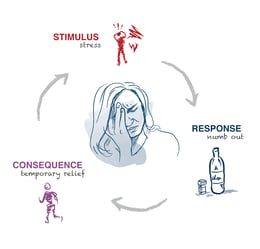 What's the link between trauma and addiction? We’re trying to understand traumatic situations that happen in someone's life and how they may impact substance abuse or addiction. Trauma and addiction can be linked even when there is not an obvious (overt) case of trauma. This is Part 2 of our an interview with The Clearing co-founder, Joe Koelzer on the subject.
What's the link between trauma and addiction? We’re trying to understand traumatic situations that happen in someone's life and how they may impact substance abuse or addiction. Trauma and addiction can be linked even when there is not an obvious (overt) case of trauma. This is Part 2 of our an interview with The Clearing co-founder, Joe Koelzer on the subject.
Read Part 1 here.
Q: For someone who might be reading this who's just starting to suspect that there is some trauma that might be related to their addiction – can you talk about the connection? How are trauma and addiction linked?
A: Okay. Here's how this plays out.
Somewhere in my past - and it doesn't have to be when I'm young, it just so happens that a lot of it does happen when we're young - I have this particular event that I experience. A piece of me gets emotionally stuck there.
Let's say it was like my math test example a little while ago. Now, every time stress comes up in my life that is similar to that, this part of me comes forward. It's providing a lot of anxiety. It's providing a lot of fear.
It's an unhealed part that goes, "Oh my gosh. Here we are. We're in another one of these situations just like when I was seven. Oh my gosh, oh my gosh, oh my gosh."
How do I deal with that? Here's where the addiction comes from.
The way that I can deal with this thing that comes up over and over – this thing that provides great amounts of anxiety and fear - is I can numb out from it. I'm looking for ways of feeling better.
One of the ways I can numb out and feel better is to drink, or use pills, cocaine, meth, whatever. By doing this, at least temporarily that's going to take care of that anxiety and that fear. It's numbing.
Q: So, it may not be a conscious choice to start out with, to start using substances that lead to addiction?
 A: Exactly. I just feel better. I don't really know why I feel bad, I just know that I can do this and I'll feel better.
A: Exactly. I just feel better. I don't really know why I feel bad, I just know that I can do this and I'll feel better.
Then, what if we're able to say, "Okay, we're not drinking or using now. Here is that feeling. Let me trace it back to where it came from, and let's work with it a different way."
Because if I can heal that, then that anxiety and that fear is not going to come forward. When it doesn't come forward, I don't feel like I have to numb it out. I'm making progress.
And multiply this by a few dozen different traumas, a few dozen different trying events.
You can have somebody with pretty paralyzing depression, anxiety, fear, self-loathing, and hopelessness. They also can get suicidal.
But it's not that hard to work with the traumas if we just do it in an organized fashion.
Q: What is the psychological process for overcoming addiction and trauma?
A: Yes. Let's use a recent event as an example, because that's the best way to get to it.
So, here was a recent event that somebody experienced. This led to feeling upset, anxious and scared.
So we ask, "Okay. When is the first time you remember feeling that way?" I'll use my second grade math test example. That's what I go back to.
We refer to that as a "traumatized aspect."
Another great set of words that are used for that are “inner child work.”
Here I've got a little seven-year-old emotional part of me that is traumatized by this math test event that happened in my past. What I'm going to do, now, is actually work with that little seven-year-old inside.
I'm going to ask that part inside of me, "What do you need to feel safe and loved? I understand that this is traumatic. I understand that you're scared. I understand that you're worried about all these different things, so what do you need to feel safe and loved?"
Then that 7-year-old part is going to say what it needs.
It's really cool; those parts of us are very, very vocal.
It might say, "I need to know it's going to be okay. I need to know that I'm going to be okay. I need to know that I'm loved. I need to know that nobody's going to be mad at me.”
The only person that can take care of that little part inside of me is me. It's now the job of the older me to take care of the younger me inside.
That sounds weird, but this is working with things at the emotional level. That's how we do that part.
Q: When you're a child, you don't have the vocabulary to express yourself. So, the process you describe provides an opportunity for a person as an adult to go back to that place with life experiences and vocabulary and be able to deal with it. Am I thinking of this correctly?
 A: You're right. You hit on something.
A: You're right. You hit on something.
It's not until roughly the age of eight or so that our brain wires in such a way that we have a place to store away this traumatic event.
What's interesting about that is that for things that happened to me roughly before the age of eight, talk therapy won't work because there's no place to store it. There's no place to go find it.
That's why Gestalt work and NLP (Neuro-Linguistic Programming) work really helps with those earlier issues, because it doesn't really have a place to hang its hat for talk therapy.
Neuro-Linguistic Programming (NLP) encompasses the three most influential components involved in producing human experience: neurology, language and programming. The neurological system regulates how our bodies function, language determines how we interface and communicate with other people and our programming determines the kinds of models of the world we create.
It's interesting. Now, with the adult me ... now that I've gone back and revisited this and worked with that inner seven-year-old ... now I'm ready to do the rational emotive therapy work at my current age.
Now, I can ask, "What are the judgments that I'm holding against myself, and others, about this situation that happened?"
For example, I judge myself as not prepared. I judge myself as maybe stupid, or not very smart. I judge myself as not as good as everybody else. I judge my teacher as mean. I judge my parents as scary. You know, I've got all of these judgments, and so we use the self-forgiveness process to release those judgments.
That's a great first step.
Then, we've got to look at those limiting beliefs. These are things that we just take for granted as givens, but they inhibit our ability to deal with trauma and addiction.
Limiting beliefs might be something like, "I'm not very good," or, "I'm stupid if I don't perform well on the test."
It's some kind of really crazy rule that we've created, right? We still live by those rules, and those are limiting beliefs.
One limiting belief would be, "My parents won't love me unless I perform well in school." Could be that I have a belief like that, and I carried that on into my adult life, saying people around me aren't going to love me unless I'm perfect?"
Well, that's not true, but that's the way I'm living my life.
Q: Does NOT having a clear trauma point contribute to an individual's sense of shame and self?
A: Absolutely it does.
Because they feel like they're flawed, or broken, or maybe less than, because they can't point to any reason why they do what they do, or why they feel the way they feel.
They have this intense shame and guilt about this stuff because they just think, “Maybe it's behavioral. Or maybe I don't have any willpower. Or maybe I'm just messed up.”
There's no focus to it.
When we're able to start working with them in this way, they begin to see that every single one of these things has got some root cause to it. And they have control over taking care of that, and they can do it themselves ... then we see the shame and the guilt begin to evaporate.
That's really important, because as we've talked about before, shame and guilt are the two most toxic emotions that we can have.
They're the first ones that will manifest as physical ailments. We've got research that tells us that mental and emotional issues, left untreated, can manifest as physical ailments. The other thing we now know is that shame and guilt are the most toxic of those emotions.
Q: What's it like when a person comes to that point of discovering that link between trauma and addiction?
A: Yes, it's really cool.
You don't start on day one of addiction treatment working with emotional level issues like this.
You've got to build the framework for doing this work and have people build some trust in themselves and their ability to process this stuff.
For us, it's in the middle of the second week of our program that we begin to work with trauma and addiction. We follow the energy back and give voice to these kinds of events.
It's great to see the light bulb come on, because they're able to say, "This is why I do what I do! This is why I feel this way. It goes back to this thing, to the first time I remember feeling like this ... oh my gosh!"
It's really cool to watch.
To learn more about trauma and addiction, download our eBook, "Healing Underlying Core Issues."
Download eBook:
Healing Underlying Core Issues
 About Joe Koelzer
About Joe Koelzer
Joe Koelzer on co-founder of The Clearing, an innovative addiction treatment center on San Juan Island, WA. He has years of counseling experience and an MA in Spiritual Psychology from the University of Santa Monica. Contact him directly with question at joe@thelclearingnw.com.



